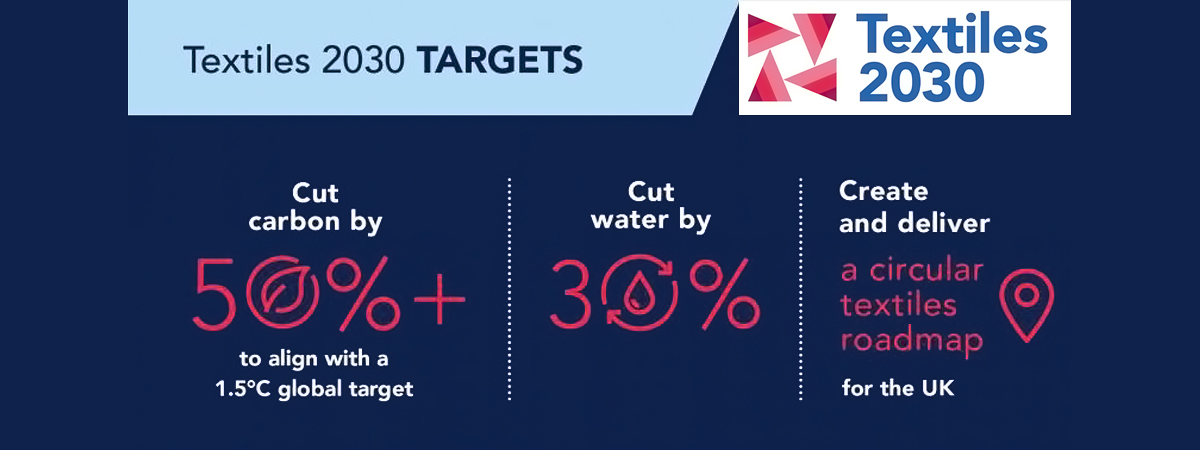Professor Parik Goswami
JOINS THE TEXTILES 2030 ADVISORY BOARD
The Director of the University’s Technical Textiles Research Centre is to join a high-profile advisory board including policymakers, online and high street retailers, charitable organisations, technical experts and trade associations that will oversee a major initiative which aims to transform the UK’s make-use-dispose fashion culture into one where products are made sustainably, used longer and then re-used or recycled.
THE University of Huddersfield is now an affiliate signatory to a major expert-led initiative that will see UK’s fashion industry leaders work together to make the sector more sustainable. The overall aim is to transform UK textiles by focusing on a move away from ‘take, make, dispose’ and more towards a circular business model.
Textiles 2030 is a new and innovative voluntary agreement led by WRAP, a global Non-Governmental Organisation (NGO) based in the UK that works with governments, businesses and individuals to ensure that the world’s natural resources are used sustainably.
Professor Parik Goswami, Head of the Department of Fashion and Textiles and Director of the University’s Technical Textiles Research Centre (TTRC), is now appointed as one of the members of the high-profile advisory board for Textiles 2030 that includes policymakers, online and high street retailers, charitable organisations, technical experts and trade associations.
“For textiles and fashion, the collaboration between designers and technologists are of paramount importance for embracing a ‘circular economy’ approach. At the University of Huddersfield, we are working to make this collaboration focused and target driven.”
Professor Parik Goswami
The board’s functions include overseeing the transformation of the UK’s make-use-dispose fashion culture into one where products are made sustainably, used longer and then re-used or recycled.
“Both the University’s Department of Fashion and Textiles, and the Technical Textiles Research Centre will play an important role in shaping this voluntary agreement,” said Professor Goswami.
“We already work with the Civic Society and local manufacturers to synthesis competitive advantage for our collaborators. Embracing a ‘circular economy’ requires a change in thinking and it requires collaborations between different functions of an organisation.
“For textiles and fashion, the collaboration between designers and technologists are of paramount importance for embracing a ‘circular economy’ approach. At the University of Huddersfield, we are working to make this collaboration focused and target driven,” he said.
A multi-disciplinary team of the University’s academics, researchers and students in fields that include chemistry and engineering as well as fashion and textiles ensures that both the Department of Fashion and Textiles and the Technical Textiles Research Centre are uniquely placed to foster real transdisciplinary research.
The voluntary agreement builds on the learning and success of the Sustainable Clothing Action Plan (SCAP 2020) and has engaged the majority of UK fashion and textiles organisations to take part in collaborative climate action.
Backed by Government, business who have already signed up include John Lewis, Primark, Sainsbury’s, Marks & Spencer and Next. In a statement issued by WRAP’s CEO Marcus Glover, he urged all of the nation’s brand and retail signatories to show their commitment by signing up to Textiles 2030 as businesses who failed to engage would be noticeable by their absence.
The environmental targets set out by Textiles 2030 are to cut carbon by 50%, sufficient to put the UK textiles sector on a path consistent with limiting global warming to 1.5°C, in line with the Paris Agreement on climate change and achieving Net Zero by, at the latest, 2050 and to reduce the aggregate water footprint of new products sold by 30%.
Rebecca Pow MP, Environment Minister, Department of Environment, Food and Rural Affairs, said: “It is time for businesses across the textiles sector to join Textiles 2030 and play their part at this critical time for the planet. Through Textiles 2030 we invite your commitment to work with WRAP, like-minded businesses and other partners towards a thriving, sustainable, circular UK textiles sector. I would like to see every CEO involved in this initiative.”
More news from the Department of Fashion and Textiles
University News - 0 articles matching your search
University News - 1 article matching your search
University News - {{numberOfPosts}} articles matching your search
- News Story

